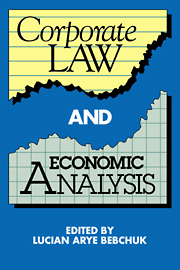Book contents
- Frontmatter
- Contents
- List of contributors
- Introduction
- Acknowledgments
- 1 Mergers, acquisitions, and leveraged buyouts: an efficiency assessment
- 2 Discounted share prices as a source of acquisition gains
- 3 Ties that bond: dual class common stock and the problem of shareholder choice
- 4 Property rights in assets and resistance to tender offers
- 5 A new approach to corporate reorganizations
- 6 The corporate contract
- 7 The state competition debate in corporate law
- 8 The positive role of tax law in corporate and capital markets
- 9 Ownership of the firm
- Index
4 - Property rights in assets and resistance to tender offers
Published online by Cambridge University Press: 15 December 2009
- Frontmatter
- Contents
- List of contributors
- Introduction
- Acknowledgments
- 1 Mergers, acquisitions, and leveraged buyouts: an efficiency assessment
- 2 Discounted share prices as a source of acquisition gains
- 3 Ties that bond: dual class common stock and the problem of shareholder choice
- 4 Property rights in assets and resistance to tender offers
- 5 A new approach to corporate reorganizations
- 6 The corporate contract
- 7 The state competition debate in corporate law
- 8 The positive role of tax law in corporate and capital markets
- 9 Ownership of the firm
- Index
Summary
The recent spate of highly publicized hostile tender offers has prompted questions about the proper reaction of target firm management to takeover bids. Traditionally, the law has not constrained management's ability to resist acquisition. To the contrary, courts recognize not just “a large reservoir of authority” in management to respond to takeover bids, but “an obligation to determine whether the offer is in the best interests of the corporation and its shareholders,” and to resist if it is not.
Particularly since the publication of an important article on the issue by Frank Easterbrook and Daniel Fischel, however, the wisdom of allowing managerial resistance has been challenged. All else being equal, resistance by any target firm reduces the bidder's net expected returns. Consequently, it is argued, other potential targets would face a greater likelihood of an advantageous takeover, and all firms would receive greater monitoring, if resistance were impermissible. In addition, it is urged, managers could not be trusted to seek a proper level of monitoring even if it were attainable, as agency problems are apparently insurmountable when managers' jobs are on the line. The Easterbrook–Fischel school therefore would ban managerial resistance to tender offers.
The opposition to managerial resistance is troubling. In the paradigm market, sellers (or their agents) are permitted to reject initial offers and bargain for higher ones. Sellers cannot bargain if they cannot reject an offer.
- Type
- Chapter
- Information
- Corporate Law and Economic Analysis , pp. 118 - 149Publisher: Cambridge University PressPrint publication year: 1990
- 1
- Cited by



